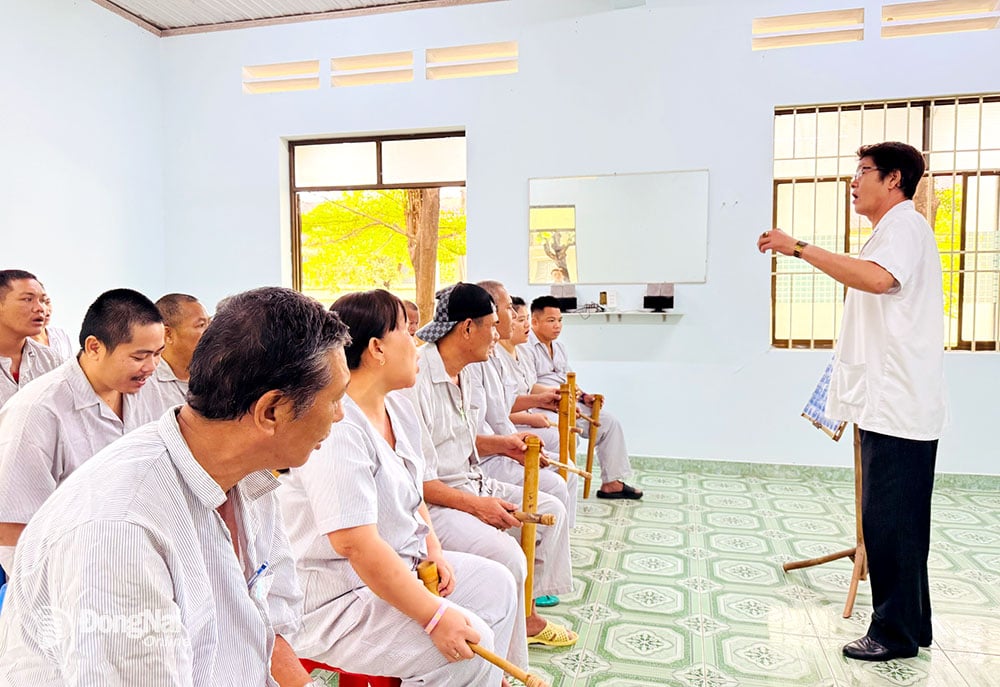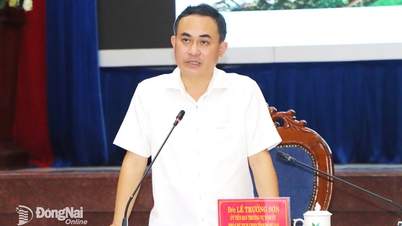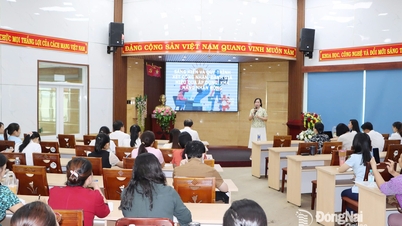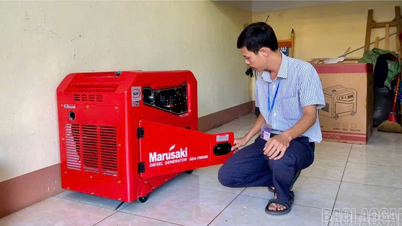 |
| A piano practice session for mental patients at the Rehabilitation Department, Central Psychiatric Hospital 2. Photo: H.Dung |
All the patients sat in their chairs very neatly and orderly, attentively watching Mr. Thanh's every hand movement and tapping the beat when it came to their notes.
Special artists
Mr. Thanh said, “Drum Rice” is not the first song he has taught to mental patients. During his 31 years working at the hospital, he has taught thousands of patients hundreds of different songs.
Talking about the opportunity to come to his current job, Mr. Thanh confided that when the Rehabilitation Department was first established, Associate Professor, Doctor, Doctor Nguyen Van Tho (Hospital Director from 1999 to 2010) selected doctors, technicians, and staff with musical talent to work at the department, including Mr. Thanh. They used music as an effective therapy to "heal" mental patients.
“We treat patients like normal people, teaching them to sing, play instruments, and dance. Music has great power, helping us connect, correct patients’ behavior, and help patients have a fun and relaxing time,” said Mr. Thanh.
After more than 1 hour of practicing the Drum and Rice song, patient D.TTL, living in Ho Chi Minh City, boasted: “The other day I participated in a melodica performance of the song "Dialogue of the Fatherland" at the 110th anniversary of the hospital's founding. Standing in front of many people, I was not nervous, confidently playing the whole song according to the instructions. As for the Drum and Rice song, I have almost memorized it. Technician Thanh taught very enthusiastically, we had fun practicing the music, feeling more relaxed and happy."
| In Vietnam, music was first considered as a therapy for mental patients in the 1970s. Military Hospital 103 (under the Military Medical University) was the first unit to apply this therapy. Through music, patients will reduce stress and anxiety, gradually regaining joy in life. |
L. is a patient suffering from postpartum depression due to her husband's infidelity. Because of boredom, L. did not sleep, just covered herself with a blanket, and did not talk to anyone. More than a year ago, L. was taken by her family to the Central Psychiatric Hospital 2 for treatment. Thanks to the attentive care of the medical staff, along with taking medication regularly and participating in music therapy, L. is now much more alert and can help the medical staff with some tasks. L. hopes to get better soon so she can go home soon.
Patient MTĐ., residing in Binh Duong province, also suffered psychological shock leading to depression due to being betrayed in love. Before getting sick, D. was an active, sociable, and dynamic teacher. When she got sick, D. became self-conscious, did not want to talk to anyone, and had unusual thoughts and actions.
After 5 years of treatment at the Central Institute of Forensic Psychiatry in Bien Hoa, D. was transferred to the Central Psychiatric Hospital 2. Every time he learned music, D. felt happier, more excited, more comfortable, and more optimistic about life.
Music connects souls
Every day from 8-9am, with an organ, technician Nguyen Phi Dung transforms into a musician, going to the hospital departments to play for patients to sing. This is the most anticipated leisure and entertainment time of the day for many patients.
After a patient finished performing the song "Missing You", Mr. NAD.K., 47 years old, residing in Vinh Long province (being treated at the Department of Emotional Disorders) volunteered to register with Mr. Dung to sing the song "Chan Que". On stage with about 70 spectators (mental patients, medical staff in the department), Mr. K. confidently performed, clearly remembered the lyrics, and played the music correctly. Encouraged by the applause of the audience, Mr. K. became even more excited and confident.
Mr. K. confided that nearly 20 years ago, he suddenly suffered from insomnia, paranoia, constantly hearing voices in his head, leaving home to wander, and was physically and mentally devastated. 5 years ago, Mr. K. was transferred by his family from a hospital in Tien Giang to the Central Psychiatric Hospital 2 for treatment.
“Here, the ladies and gentlemen take good care of me. I am taught to sing, play instruments, practice yoga, and work. What I like most is singing because every time I perform on stage, I feel very happy. Now I can sleep, I no longer have delusions, and I really want to go home,” Mr. K. shared.
According to technician Nguyen Phi Dung, music has a magical power, helping to connect millions of souls. When singing, patients can express their emotions, when happy they laugh, when sad they cry, recovering a lot of memory. Because to sing a song, patients are required to remember the lyrics and the melody. There are people who never laugh or speak for a very long time, but when exposed to music and singing, they are very happy. Once they have sung a song, they will continue to register to sing again the following days.
Mr. Phi Dung said: “Through each song, the patient's emotions are revealed, it can be missing family, missing parents, wife/husband, children, or it can also be love for homeland, country, friends... If that morning they participate in a fun game, then the whole day will be happy too.”
It can be said that music is an indispensable catalyst to help life become sublime, and is also a precious "medicine" to help soothe the pain in the soul. Using music as a therapy to "heal" mental trauma has helped many mental patients quickly stabilize their emotions, and be able to return to their families and normal life.
Hanh Dung
Source: https://baodongnai.com.vn/dong-nai-cuoi-tuan/202503/am-nhac-lieu-phap-chua-lanh-cho-benh-nhan-tam-than-9652624/




![[Photo] Prime Minister Pham Minh Chinh chairs a meeting of the Government Standing Committee to remove obstacles for projects.](https://vphoto.vietnam.vn/thumb/1200x675/vietnam/resource/IMAGE/2025/10/06/1759768638313_dsc-9023-jpg.webp)
![[Photo] Prime Minister Pham Minh Chinh chaired a meeting of the Steering Committee on the arrangement of public service units under ministries, branches and localities.](https://vphoto.vietnam.vn/thumb/1200x675/vietnam/resource/IMAGE/2025/10/06/1759767137532_dsc-8743-jpg.webp)



























































































Comment (0)